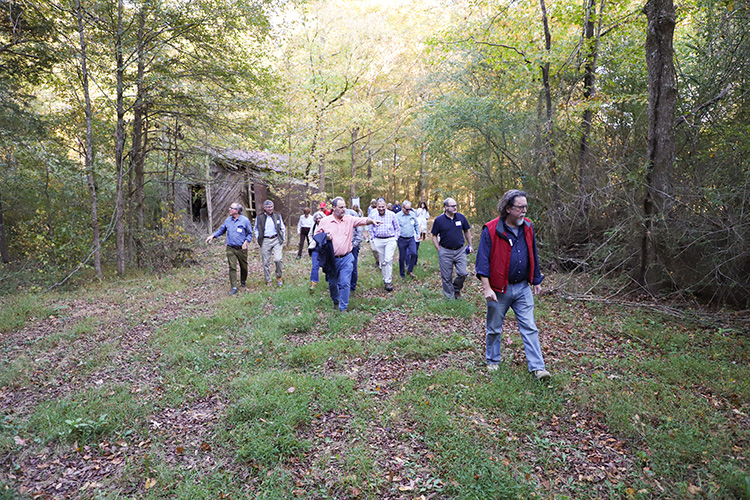
The life and work of the late Julia Reed, author, columnist and speaker, will be celebrated with the naming of the Julia Reed Kitchen at the gathering pavilion of the Greenfield Farm Writers Residency, which is being developed by the University of Mississippi. Support for the kitchen, a $250,000 gift, is being provided by the Julia Evans Reed Charitable Trust. Submitted photo
Kitchen at Greenfield Farm to be named for writer, serve as a gathering space
The Greenfield Farm Writers Residency, being developed by the University of Mississippi on a mule farm once owned by author William Faulkner, would have been a haven for the late Julia Reed, an author, columnist and speaker known for explaining Mississippi both to the world and to itself.
Greenfield Farm, the first full-time nonprofit writers residency in Mississippi, will be a retreat-style compound built on a 20.4-acre farm between Oxford and New Albany owned by the university.
Reed’s name will continue to be revered by writers at the farm’s gathering pavilion, which includes a kitchen named in her honor and supported by a $250,000 gift from the Julia Evans Reed Charitable Trust.
“What a wonderful and perfect gift!” said her mother, Judy Reed. “Nothing would please her more than to have the kitchen named for her.
“Her own kitchen was the source of hundreds of parties. Her skill and passion for decorating, cooking, arranging and bringing old and new friends together was a celebration of beauty and of life, which she generously shared with friends and fans who enjoyed her work.
“When she opened a local bookstore in the Wetherbee House in Greenville, she redid the bedroom in the back wing, thinking one day she would host a writer-in-residence there. In large measure, that unfulfilled dream has come true.”
Born in Greenville, the writer traveled the world and was a longtime editor for Vogue magazine. She also contributed to The New York Times, Newsweek, Conde Nast Traveler, The Wall Street Journal, U.S. News & World Report, and Elle Décor. Until her death, she was a “cornerstone” of Garden & Gun magazine, where loyal readers and fans turned to her column for dispatches from her world.
Keith Meacham, board chair of the Reed Charitable Trust who with her husband, Jon Meacham, shared a 30-year friendship with the writer, said Reed built her own “writers retreat for one” in Greenville and called it her “Delta Folly,” making support of Greenfield Farm a natural choice.
“Julia understood the importance of a place to retreat to clear your head, get down to work, meet the deadline and gather together people she loved – or might get to like,” Meacham said.
“Nobody had a voice like Julia’s – whether you were hearing it from across the room at a cocktail party or reading it on the page. The idea that a gift from Julia’s trust could support other writers in finding their voices appealed very much to us and to Julia’s family.
“And being able to name the kitchen, the heartbeat of any house or retreat, in her memory seemed so fitting since Julia loved nothing more than to cook up a delicious meal and tell stories at a crowded table.”
Meacham said she hopes the gift and the work of Greenfield Farm will bring aspiring writers to the state, where they will be introduced to Reed’s work and that of other Mississippi writers.
“Julia Reed wrote well about many subjects, from politics to cultural mores to identity,” said John T. Edge, director of the university’s Mississippi Lab, which will operate the facility. “Much of Julia’s best work focused on the pleasures of good food and drink and on the possibilities time at a table promises.
“To honor that work, writers at Greenfield Farm will gather under the banner of her name and gain ongoing inspiration from her legacy.”
Set to open in the third quarter of 2025, the Greenfield Farm campus will include four new studios, the new pavilion with the Julia Reed Kitchen, a restored farm shed and a restored cabin. Walking trails and communal spaces will connect writers to the natural world. Exhibits will tell the story of this land and the people who worked it, beginning with the Chickasaw and concluding with Faulkner.
Each year, Greenfield Farm will steward and connect 50-plus writers and thinkers who have ties to Mississippi. Writers will stay an average of two to three weeks at no charge, and stipends of $1,000 per week will be awarded to those staying in the overnight studios.
Some $4.4 million is already pledged through private support and university-committed funds.
Reed, who died of cancer in August 2020, was educated in Greenville and at the Madeira School for Girls, Georgetown University, and American University. She lived and worked in Washington, D.C., New York City, New Orleans, and Greenville.
She was credited with turning Greenville’s Delta Hot Tamale Festival into a popular gathering of writers, chefs and artists to raise money for affordable housing and development. Mississippi Governor Phil Bryant and the state’s Arts Commission named her a cultural ambassador in 2019, in part for her work with the festival.
Reed was described as “an irreverent, expansive chronicler of politics, food and Southern life” and “a tsunami of talent, charm and energy.”
Her books include: “Dispatches from the Gilded Age,” “Ham Biscuits, Hostess Gowns and Other Southern Specialties: An Entertaining Life,” “The House on First Street: My New Orleans Story,” “Julia Reed’s New Orleans: Food, Fun and Field Trips for Letting the Good Times Roll,” “South Toward Home, Adventures and Misadventures in My Native Land,” “Julia Reed’s South: Spirited Entertaining and High-Style Fun All Year Long,” “But Mama Always Put Vodka in Her Sangria,” “Queen of the Turtle Derby and Other Southern Phenomena” and “One Man’s Folly: The Exceptional Houses of Furlow Gatewood.”
Reed served on the national advisory board of the Eudora Welty Foundation and the board of the Link-Stryjewksi Foundation. She was a founding member of the board and longtime trustee of the Ogden Museum of Southern Art.
The Julia Evans Reed Charitable Trust continues the philanthropic work that Reed began by supporting organizations dedicated to providing the things in life she deemed essential: a good home, nourishing food, a quality education and opportunities for learning, literacy and engagement in the arts.
For more information about supporting the Greenfield Farm Writers Residency, contact John T. Edge at johnt@olemiss.edu or 662-715-9046
By Tina H. Hahn and UM Development staff







